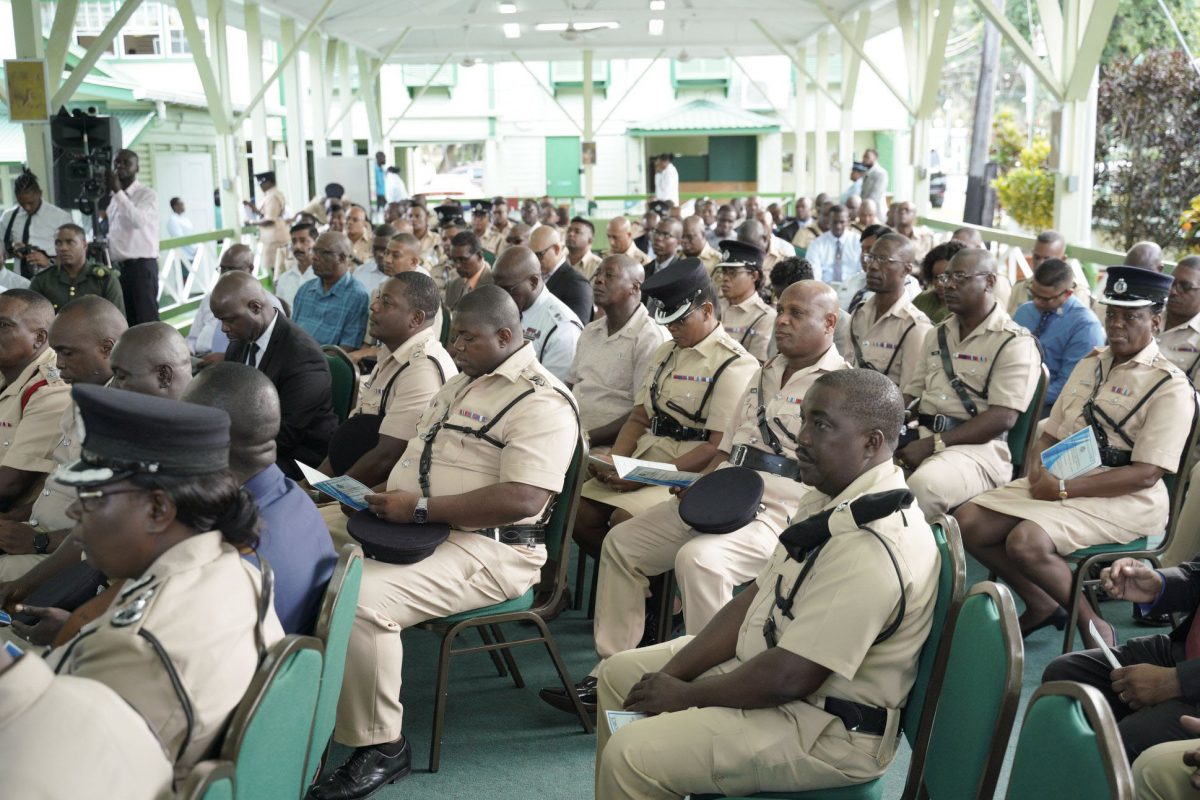President David Granger yesterday said that during his proposed “Decade of Development” the Guyana Police Force (GPF) would be restructured and augmented to effectively respond to local and transnational crime as well as interpersonal violence.
As part of this hoped-for restructuring several units such as the Tactical Services Unit and the reestablished Aviation Unit will be tasked with providing service to hinterland communities.
Speaking at the opening ceremony of the Police Officers’ Annual Conference at State House, Granger noted that the number of Venezuelan migrants in Guyana currently outnumbers police officers at approximately five to one and stressed the Force’s personnel strength of about 4,600 is inadequate to offer they and other members of border communities sufficient protection.
Granger, who is performing the functions of a caretaker President and is facing general elections on March 2nd, said that given the size of the country, the Force is challenged to enforce the law effectively, everywhere especially since access to nearly 75% of it is difficult for the police.
Consequently, “the Force must be brought to strength” in numbers, infrastructure and equipment.
“The vast areas, long distances and limited communications and transportation assets available to the Police Force restricts its ability to enforce the law,” Granger remarked, adding that as a national rather than coastal organization the Police Force must extend its reach to the most thinly populated and geographically challenging terrain in the country.
“Its reach should extend to the most remote corners of the country. Its 74 police stations, 24 outposts and six checkpoints are inadequate for our territory, population and incidents of transnational crime. There have to be changes so no part of the country remains unmanned and no crime remains undetected,” the Head of State explained.
He acknowledged that over the last five years not only has personnel increased by 37.6% from 3,610 in 2014 to 4,956 in 2019 but the force is also supported by a 1,990-member constabulary and noted that recent reforms aimed at reorganizing, reequipping and re-professionalizing the force must continue.
“Trained police officers must be deployed away from non-core functions such as immigration, certification of vehicular fitness and issuance of gun licenses. These non-core functions must be outsourced so as ensure that more trained ranks are deployed to crime-fighting duties,” the President explained.
He further stressed that the Force must groom a more versatile officer corps as the police officer of the future must be equipped with a wide range of skills and competencies.
“He or she must be able to operate in different environments and be capable of working and living on the coastland or in the hinterland,” the president said.
The President has indicated that now defunct “Aviation Unit” of the GPF will be re-established during the decade of development to allow the force to improve its coastal and border surveillance and to respond rapidly to threats in any part of the country whether night or day.
Additionally the Tactical Services Unit will have expanded responsibilities. It will be expected to protect the country’s border ‘frontline’ communities in light of the migration from regional and neighbouring countries.
He noted that Venezuelan migrants in the country who outnumber Police Officers, continue to face criminal threats, particularly from contraband, human, gun and narcotics trafficking mainly in the hinterland.
Internal Security Squad
“The Internal Security Squad will continue to be based at Eve Leary and will be trained to perform its current functions, mainly on the Coastland. So there will be two Squads, a Hinterland Squad and the Coastland Squad,” he explained.
The Mounted Branch, will also be increased to provide greater security for the hinterland communities and the back dams “where some unpleasant things occur in mining and coastland communities” as many of these communities are more effectively policed by horseback.
Further the Marine Branch of the GPF will, the President said, be strengthened to provide every division with the manpower and means to respond to crimes and protect riverine communities.
“It will also be required to collaborate with the Guyana Defence Force’s Coast Guard and the Maritime Administration Department (MARAD) of the Ministry of Public Infrastructure, now that there is increased activity from the petroleum exploration companies and there is greater opportunity for crime,” he said.
The final branch to be augmented will be the Communications Branch which will link every police station through a secure communications network.
“This interconnectivity will allow for inter-divisional cooperation in intercepting and combatting criminal activities,” the president stressed.
Speaking directly to the Officers who gathered under the theme “Maintaining the Security Sector Reform Implementation to Enhance Public Trust, Security and Capacity Building”, Granger reminded that the conference is “expected to be forward-looking and not retrospective.
“Officers must commit to leading the Force into a new era of modernization and greater professionalization and to accelerating the reforms taking place. Officers, ultimately, are the guarantors of human safety and public security all the time, to everyone, everywhere in Guyana,” he concluded.
Police Commissioner Leslie James in his presentation explained that the force continues to implement strategies and systems from its three-year strategic plan. The plan was first implemented in 2019 and is set to conclude in 2021.
According to James the implementation of this plan has led to greater efficiency and maximum development in the force. He said that the collective efforts of the officers has improved operational capacity leading to a decrease in serious crimes by 16.8% which has directly stemmed from accomplishments such as sting operations, policing strategies, a revamping of the 911 emergency system and various community outreach programmes.
